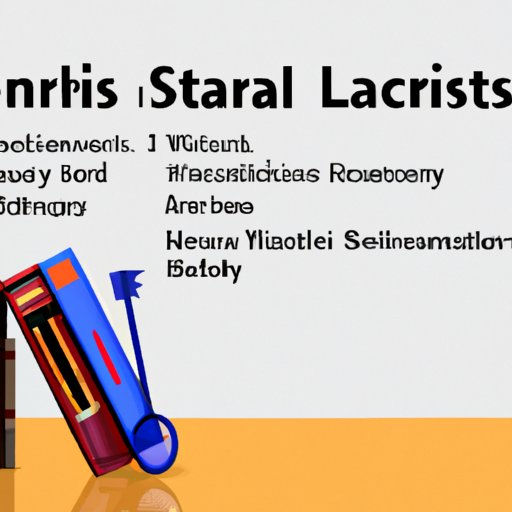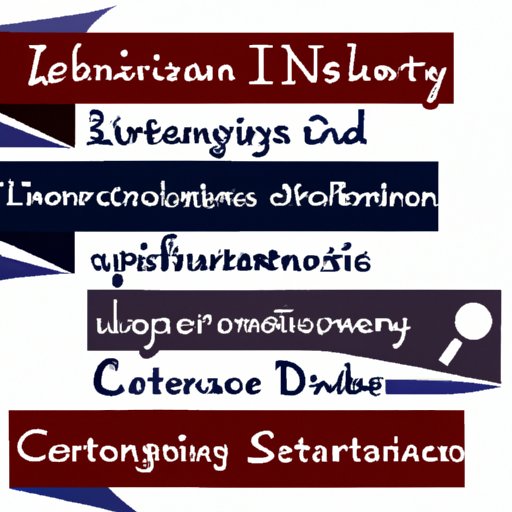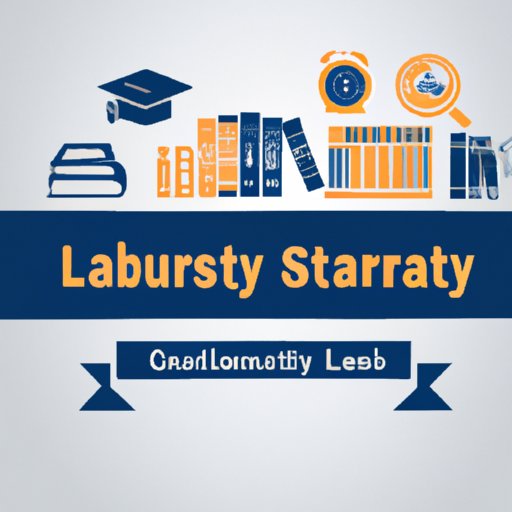Introduction
Library science is a field of study that focuses on the management and organization of information and resources in libraries. Library science majors learn how to efficiently manage collections of books, magazines, and other materials. They also develop skills in cataloging, classification, and reference services. Library science majors can choose from a variety of courses to fulfill their degree requirements.
The purpose of this article is to provide an overview of the classes that are required for library science majors. We will look at the core courses, electives, and other essential information such as understanding the requirements and choosing the right classes. Finally, we will explore the different types of courses available for a library science degree, including traditional courses, online courses, and internships.
A Comprehensive Guide to the Required Courses for Library Science Majors
The courses that are required for library science majors vary depending on the school and program. However, there are some core courses that are typically included in most library science programs. These include:
Core Courses in Library Science
- Cataloging and Classification: This course introduces students to the principles of organizing information and resources. Students learn how to use catalogs and classification systems to organize materials.
- Research Methods: In this course, students learn how to effectively search for and evaluate information. Topics covered include database searching, online research, and critical evaluation of sources.
- Information Literacy: This course teaches students how to access, analyze, and use information. Topics covered include using library resources, developing search strategies, and evaluating sources.
- Reference Services: This course introduces students to the concepts and techniques of providing reference services to library patrons. Topics covered include information retrieval, bibliographic instruction, and reference interviews.
- Library Management: This course covers the principles and practices of managing libraries. Topics include collection development, budgeting, and personnel management.
- Digital Libraries: This course introduces students to the concepts and technologies involved in creating and managing digital libraries. Topics include digital curation, metadata, and digital preservation.
In addition to these core courses, most library science programs offer a variety of electives. These may include:
Electives
- Special Topics in Library Science: This course covers advanced topics in library science, such as copyright law, web archiving, and digital asset management.
- Web Design: This course introduces students to the principles of designing websites for libraries. Topics covered include interface design, usability testing, and content management.
- User Experience: This course covers the principles of user experience design and how it applies to library websites. Topics include user research, information architecture, and usability testing.
- Archival Studies: This course introduces students to the principles of archival practice. Topics include appraisal, arrangement, and description of archival material.

The Essentials: What You Need to Know About Library Science Classes
Before you enroll in any library science classes, it is important to understand the requirements. Most library science programs require a certain number of credit hours in order to graduate. Additionally, many programs have specific requirements for core courses and electives.
It is also important to choose the right classes for your interests and career goals. For example, if you are interested in working in a public library, you may want to consider taking classes in reference services and library management. If you are interested in digital libraries, you may want to take classes in web design and user experience.

Exploring the Different Types of Courses for a Library Science Degree
There are several different types of courses available for library science majors. Traditional courses are offered in person at universities and colleges. Online courses are also available and offer students the flexibility to complete coursework at their own pace. Finally, internships are a great way for students to gain practical experience in library settings.
Traditional Library Science Courses
Traditional library science courses are offered in person at universities and colleges. Students attend lectures and participate in discussions with their classmates. These courses provide an opportunity to interact with professors and peers, and to gain hands-on experience with library materials.
Online Courses
Online courses are becoming increasingly popular for library science majors. These courses offer students the flexibility to complete coursework at their own pace. Additionally, many online courses have discussion boards where students can interact with their peers and professors.
Internships
Internships are a great way for students to gain practical experience in library settings. Many library science programs offer internships in various areas, including archives, special collections, and public libraries. Internships provide students with the opportunity to apply their classroom knowledge in real-world settings.
Conclusion
Library science majors must complete a variety of courses to fulfill their degree requirements. There are core courses that are required for most library science programs, as well as electives that allow students to tailor their studies to their interests and career goals. Additionally, there are several different types of courses available for library science majors, including traditional courses, online courses, and internships.
To summarize, library science majors must complete a variety of courses to earn their degree. These include core courses in cataloging and classification, research methods, information literacy, reference services, library management, and digital libraries. Additionally, students can choose from a variety of electives and explore different types of courses, such as traditional courses, online courses, and internships. Completing these courses can help prepare students for successful careers in the library science field.
(Note: Is this article not meeting your expectations? Do you have knowledge or insights to share? Unlock new opportunities and expand your reach by joining our authors team. Click Registration to join us and share your expertise with our readers.)
